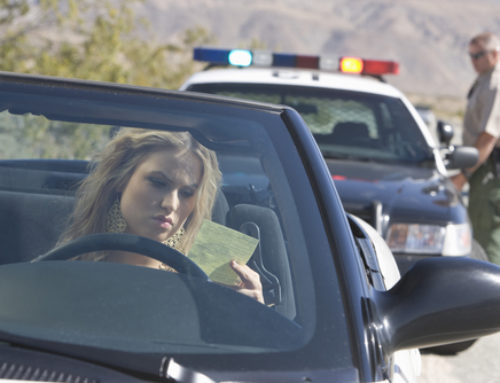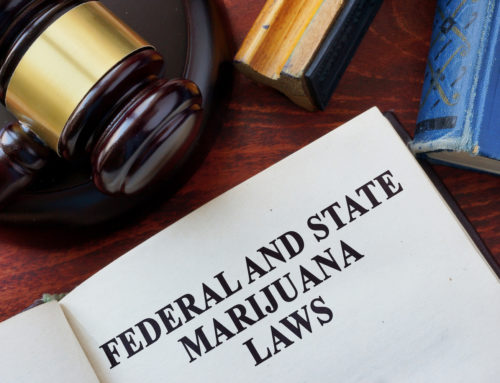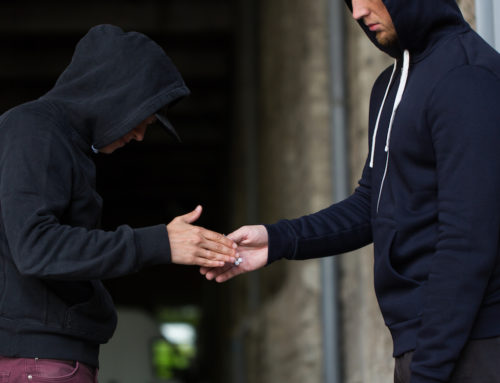 Challenging the illegal search of a vehicle in a criminal defense of gun or drug possession charges in California is a common scenario for a person accused of these crimes. In many instances, drug and gun charges arise when a person is stopped in their vehicle on a routine traffic stop and a subsequent search leads to the seizure of drugs and/or guns. Under the California Penal Code, felony drug and gun possession charges can be very serious and the person arrested often times runs the risk of being sentenced to state prison in the California Department of Corrections. However, when a person is arrested on gun and/or drug charges after a routine traffic stop, they should immediately consult with an experienced criminal defense attorney in California including Los Angeles and Orange County to determine whether the case may be dismissed by filing a motion to suppress evidence pursuant to the 4th Amendment of the United States Constitution.
Challenging the illegal search of a vehicle in a criminal defense of gun or drug possession charges in California is a common scenario for a person accused of these crimes. In many instances, drug and gun charges arise when a person is stopped in their vehicle on a routine traffic stop and a subsequent search leads to the seizure of drugs and/or guns. Under the California Penal Code, felony drug and gun possession charges can be very serious and the person arrested often times runs the risk of being sentenced to state prison in the California Department of Corrections. However, when a person is arrested on gun and/or drug charges after a routine traffic stop, they should immediately consult with an experienced criminal defense attorney in California including Los Angeles and Orange County to determine whether the case may be dismissed by filing a motion to suppress evidence pursuant to the 4th Amendment of the United States Constitution.
1. Challenging Unlawful Searches and Seizures in California — Warrantless Traffic Stop Search
The Unites States Constitution protects persons accused of crimes in many ways. In regards to searches of persons or their property, such persons have reasonable expectation of privacy, as guaranteed by the Fourth, Fifth and Fourteenth Amendments to the United States Constitution. California Penal Code section 1538.5 (a) provides in pertinent part: a defendant may move to suppress as evidence any tangible or intangible thing obtained as a result of a search or seizure on the grounds that the the search or seizure without a warrant was unreasonable.
In most cases, searches of vehicles from routine traffic stops are without a warrant. As result, an experienced criminal defense lawyer can rely on favorable California and United States Constitutional law in challenging a warrantless search. The California Supreme Court in People v. Williams (1999) 20 Cal.4th has ruled that the burden of justifying a warrantless search, seizure, arrest or detention falls upon the prosecution. A competent criminal defense attorney will explain to a person arrested pursuant to a warrantless search that the defendant’s only burden is to show, by competent evidence presented or stipulation entered into at the hearing, that the search or seizure occurred without a search or arrest warrant and that the evidence sought to be suppressed is a fruit of that act.
The defendant has the burden of raising the issue of an unlawful warrantless search, which is generally satisfied if defendants simply assert the absence of a warrant and make a prima facie showing to support that assertion. It is important to consult with an experienced criminal defense attorney so that all proper challenges to an illegal search and seizure pursuant to items seized in a vehicle will be made to the Court.
2. Searching A Vehicle or Person Incident To An Arrest In California
Often times, the police and prosecution will try and justify a warrantless search of a person or vehicle after a routine traffic stop by claiming the search was lawful since it was incident to an arrest or a detention. The United States Supreme Court has explained that it is the law in California as well as throughout the United States that generally, during or near the time of arrest, officers only may search the person or the area within “grabbing area” of the person. Chimel v. California, (1969) 395 US 752, 763). However, courts have applied the Belton standard to automobile searches. (New York v. Belton (1981) 453 US 454, 460). The officers may search an arrestee’s vehicle only if:
1) There was a lawful custodial arrest of a vehicle occupant;
2) The search is limited to passenger compartment and objects found in it;
3) Searches are contemporaneous with the arrest itself.
The United States Supreme Court in Belton did not alter the Chimel rule, reasoning that the passenger compartment was within the area where an arrestee may reach for a weapon. Thus, where the officers have secured an arrestee and it is unlikely that the arrestee will manage to escape, the scope of warrantless search must be narrowly confined to making sure the arrestee cannot pose a danger to himself or others. (See United States v. McConney, (1984) 728 F.2d 1195, 1207 (9th Cir.) (en banc ), cert. denied, 469 U.S. 824).
As such, a warrantless search must be limited to the area in the arrestee’s immediate control, United States v. Vasey, (9th Cir. 1987) 834 F. 2d 782, and the search must be contemporaneous to the arrest itself. In United States v. Vasey,supra, the defendant was observed speeding by an police officer and pulled over. The officer saw the defendant “stuffing his hand between the seats and handling something furtively on the right rear floorboard.”. The officer, suspicious of drug activity, searched the vehicle thirty to fourty-five minutes after the defendant’s arrest. The Court ruled that the search could not be incident to the arrest because the defendant was arrested and placed the rear of the police vehicle at the time the search was conducted.
In many cases, persons are unlawfully handcuffed, placed in a police vehicle or otherwise physically restrained during a routine traffic stop and then their vehicle is searched and often times drugs and/or guns are found. In such cases, an experienced criminal defense lawyer should be consulted to determine whether the warrantless search can be challenged on the grounds that the search and seizure of the persons vehicle violated the persons rights under the California and United States Constitutions.
Importance of Hiring A California Criminal Defense Attorney When Charged With Possession of Illegal Drugs or Weapons As A Result of A Vehicle Search
The importance of hiring quality defense counsel in these cases cannot be stressed enough. Motions to suppress evidence can be the difference between a dismissal or reduction of charges or facing all counts and the accompanying penalties including jail and state prison time. Proper investigation about the traffic stop and search and proper preparation of the pleadings are crucial to the motion’s success. An attorney familiar with the California court system and local procedural rules for Los Angeles, Orange County and the Inland Empire (including San Bernardino and Riverside) makes your chances of winning your freedom the best that they can be!





